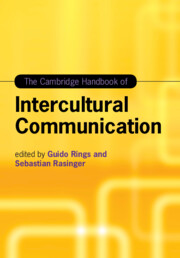Book contents
- The Cambridge Handbook of Intercultural Communication
- Cambridge Handbooks in Language and Linguistics
- The Cambridge Handbook of Intercultural Communication
- Copyright page
- Contents
- Figures
- Tables
- Contributors
- Acknowledgements
- Introduction
- Part I Introducing Intercultural Communication
- Part II Theoretical Approaches
- Part III Methods
- Part IV Application
- 22 Intercultural Communication in the Context of the Hypermobility of the School Population in and out of Europe
- 23 Culture and Management
- 24 Language and Othering in Contemporary Europe
- 25 Black British Writing
- 26 Cultural Encounters in Contemporary Latin American Cinema
- 27 Religion and Intercultural Communication
- 28 Irish–English Cultural Encounters in the Diaspora
- 29 Intercultural Dimensions in Academic Mobility
- Part V Assessment
- Index
- References
25 - Black British Writing
Benjamin Zephaniah’s Didactic Poetics
from Part IV - Application
Published online by Cambridge University Press: 18 February 2020
- The Cambridge Handbook of Intercultural Communication
- Cambridge Handbooks in Language and Linguistics
- The Cambridge Handbook of Intercultural Communication
- Copyright page
- Contents
- Figures
- Tables
- Contributors
- Acknowledgements
- Introduction
- Part I Introducing Intercultural Communication
- Part II Theoretical Approaches
- Part III Methods
- Part IV Application
- 22 Intercultural Communication in the Context of the Hypermobility of the School Population in and out of Europe
- 23 Culture and Management
- 24 Language and Othering in Contemporary Europe
- 25 Black British Writing
- 26 Cultural Encounters in Contemporary Latin American Cinema
- 27 Religion and Intercultural Communication
- 28 Irish–English Cultural Encounters in the Diaspora
- 29 Intercultural Dimensions in Academic Mobility
- Part V Assessment
- Index
- References
Summary
Deirdre Osborne examines Black British poetry as a distinctly aesthetic vehicle for catalysing intercultural communication. The chapter explores the concept of ‘Didactic Poetics’ in relation to intercultural communication as both ‘instructive’, that is teaching the reader how to read, listen and (re-)contemplate culture from minoritized perspectives, and ‘consequentialist’, in the sense that it speaks to a collective experience of the consequences of the British Empire’s aftermath and the inequalities caused by its legacy. In setting the parameters of cultural change from a frequently marginalized position in Britain’s institutions, Black British writers challenge canonical competencies to exert a palpable influence upon intercultural awareness. Of particular interest are Benjamin Zephaniah’s 1990s works City Psalms (1992), Propa Propaganda (1996) and School’s Out: Poems Not For School (1997), because they exemplify Spivak’s call to deconstruct the dominant cultural processes that denote knowledge value through ‘reversing, displacing, and seizing the apparatus of value-coding itself’ (1990), and to build coalitions of resistance and understanding (Lugones, 2007).
Keywords
- Type
- Chapter
- Information
- The Cambridge Handbook of Intercultural Communication , pp. 412 - 431Publisher: Cambridge University PressPrint publication year: 2020

